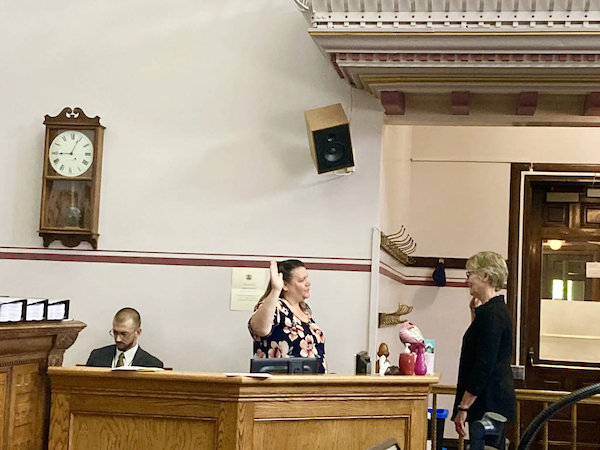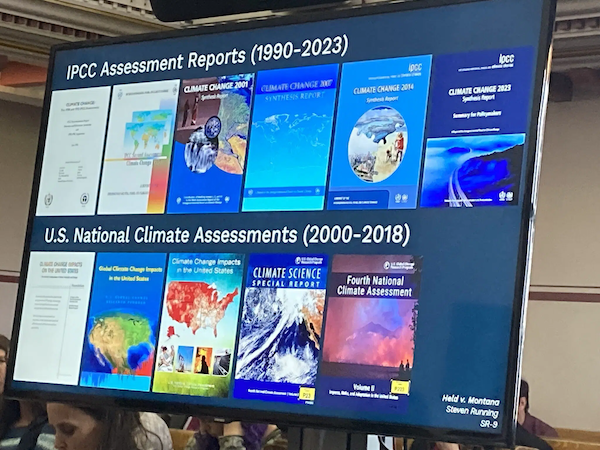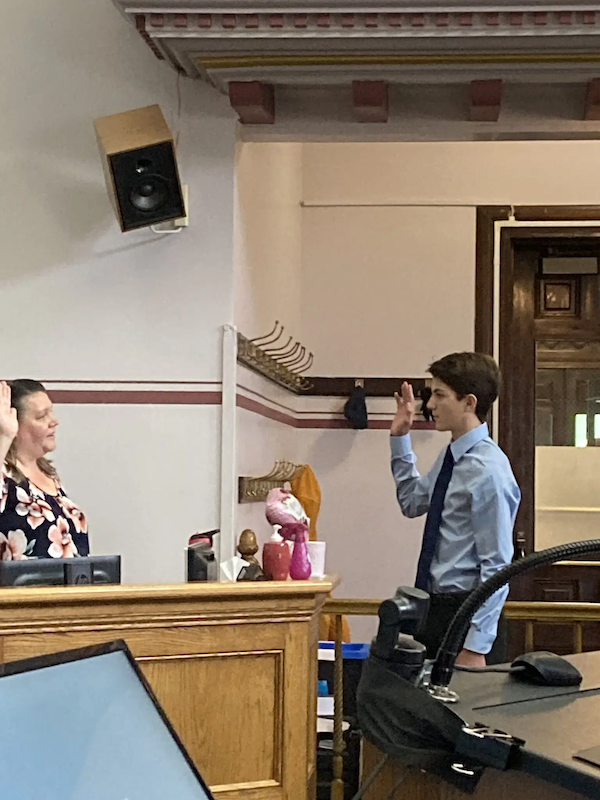By Dana Drugmand, an environmental journalist focusing on climate change and climate accountability reporting. She writes regularly for DeSmog covering topics such as fossil fuel industry opposition to climate action, climate change lawsuits, greenwashing and false climate solutions, and clean transportation. Originally published at DeSmog.

Paleoclimatologist Cathy Whitlock appeared at the Montana youth climate trial on Tuesday. Credit: Dana Drugmand.
“We have been warning about the dangers posed by climate change for decades,” climate scientist Cathy Whitlock testified to a Montana court on Tuesday, “and yet Montana continues to aggressively pursue an expansion of fossil fuel utilization and production.”
Whitlock, a professor emeritus at Montana State University, is one of a number of climate scientists scheduled to testify for 16 young Montanans who have sued the state for continuing to favor oil, coal, and gas development despite the worsening climate crisis.
The youth charge that the state’s strong preference for fossil fuel development has violated their right, guaranteed under Montana’s constitution, to a clean and healthful environment.
Their case, Held vs. Montana, is the first U.S. climate lawsuit led by young people to go to trial, and the first U.S. climate trial grounded in constitutional claims.
The trial is currently underway in Helena, Montana.
During her testimony, Whitlock said that climate science has made it clear that there is an urgent problem, and addressing it requires lessening fossil fuel dependency as quickly as possible.
Whitlock’s testimony backed up statements from the stand on Monday by Steven Running, also a professor emeritus at the University of Montana. Running was a major contributor to the United Nations Intergovernmental Panel on Climate Change’s Fourth Assessment Report, and shared in the 2007 Nobel Peace Prize awarded to the IPCC and Al Gore.

The Montana case is only the second time climate science has been presented in a U.S. court – the first was in 2007. Credit: Dana Drugmand.
Running testified that in subsequent reports, such as the most recent IPCC scientific report published in March, scientists have expressed increasing alarm, using terms like “unequivocal” and “very high confidence” in regards to the risks of climate destabilization from continuing to burn fossil fuels. Climate scientists are “literally trying to get humanity to just pay attention,” he told the court.
In the IPCC’s latest report, scientists have warned that “there is a rapidly closing window of opportunity to secure a livable and sustainable future for all…choices and actions implemented in this decade will have impacts now and for thousands of years.”
Some of the children named in the case told the court on Tuesday that by requiring that regulators turn a blind eye to climate change, the state is enabling further fossil fuel development despite increasingly dire warnings from climate scientists about the dangers of doing so.
“It makes me feel almost betrayed because they’re not doing their job protecting me and the other plaintiffs in Montana,” 15-year-old Mica Kantor of Missoula testified.
It’s “kind of a now or never situation”, 15-year-old Badge Busse of Kalispell, Montana said from the stand.
“History Being Made” in Montana
According to Prof. Michael Gerrard, founder and faculty director of the Sabin Center for Climate Change Law at Columbia Law School, this is only the second time in the United States that climate science has been presented at a trial.
The first was a 2007 federal case in which automakers challenged Vermont’s adoption of California’s strict greenhouse gas emissions standard for new cars and trucks.
Three climate scientists testified at that trial, including James Hansen, who at the time was the director of NASA’s Goddard Institute of Space Studies at Columbia University. The U.S. District Court in Vermont court ultimately upheld the state’s regulation.
Patrick Parenteau, professor emeritus and senior fellow for climate policy at Vermont Law School, confirmed that this “probably was the first trial involving presentation of scientific evidence on the risks of climate change.”
Still, Parenteau told DeSmog, at the climate trial in Montana, “history [is] being made regardless of the outcome.” It is the first time that children and teens are directly recounting their personal experiences of the worsening climate crisis in a live courtroom, joined by climate scientists explaining the causes of those impacts in expert testimony.

Youth plaintiff Mica Kantor is sworn in prior to testifying in the Montana climate trial. Credit: Dana Drugmand.
Several of the youth plaintiffs have testified that they are seeing and breathing heavy smoke from wildfires more often.
Grace Gibson-Synder, a 19-year-old from Missoula who played high school soccer, recalled that many practices ended up being “smoked out.” It has become “kind of an inescapable phenomenon to deal with the smoke during the summer in Missoula,” Gibson-Snyder testified.
Climate scientists say the fires that generate this smoke are now burning more intensely and over longer periods, and that fossil fuels are clearly the cause. “The fire season in Montana is a full two months longer now than it was 40 years ago,” Running said from the witness stand.
A recent analysis by the Union for Concerned Scientists has linked worsening wildfires in western North America to carbon pollution stemming from the products of the world’s largest fossil fuel companies – the “Carbon Majors.”
Along with more severe wildfires, Montana is experiencing more extreme heat days, droughts, flooding, warming of rivers and streams, and declining winter snowpack. The namesake glaciers of Glacier National Park are melting.
The youth suing the state say that these changes, which have accelerated in their lifetimes, have worsened their quality of life – notably the ability to enjoy and recreate outdoors in a state known for its vast and splendid landscape.
‘Every Ton of CO2’ Adds to Climate Change
Running and Whitlock testified that the only way to preserve the right to a clean and healthful environment enshrined in Montana’s constitution is to urgently transition away from fossil fuels.
“Montana’s promotion of fossil fuel production is making the problem worse, because every ton of CO2 makes a difference,” Whitlock said on the stand.
Running agreed, telling the court, “We’re going the wrong way in this issue with every ton of CO2 emitted.”
Recently, Montana’s Republican-led state government enacted multiple laws that deepen the state’s reliance on fossil fuels and weaken environmental protections. One of the measures, a change to the Minnesota Environmental Policy Act, explicitly bars consideration of climate change in environmental reviews of proposals for major projects like mines and pipelines. Whitlock called that policy a “big step backwards. Climate change is the ultimate crisis we’re all facing.”
Another new law, signed by Gov. Greg Gianforte in March, repealed the state’s energy policy statute, which contained provisions explicitly promoting fossil fuel development. The state then petitioned the court to have a portion of the lawsuit challenging that policy thrown out. Judge Kathy Seeley of the 1st District Court in Montana, who is overseeing the trial, agreed and dismissed that part of the youth case just weeks before the start of trial.
While that move has narrowed the youths’ case against the state, it does not change any of the underlying scientific evidence substantiating the plaintiffs’ contention that Montana’s government is actively contributing to dangerous climate change.
As Running told the court from the witness stand: “It’s pretty hard to repeal physics.”


Lest we forget the AMAZING state legislature reversed a 40 years plus citizens initiative prohibiting nuclear power.
Greg Gianforte, the pugilistic Governor who was booked and charged with assault of a Journalist, is a vulgar thug. It’s a global trend in leadership.
https://dailymontanan.com/2022/02/05/big-problems-with-small-nuclear-reactor-proposals-for-montana/
Fire season in Montana used to be taken seriously. But I suppose all the poor folk who used to go out riding on fire watch were bought out for luxury ranchettes, and the watch towers torn down because they spoil the view. Why worry about wildfire when safety is a quick private helicopter ride away?
Met a GIS specialist who works for insurance companies deploying private fire fighting services to go out and hot-shot urban/ wildland interface McMansions on behalf of the insurors.
She purportedly made a very comfortable 6 figure income, which is the new Montana… and the entire operation was more cost effective than suffering property casualty losses on the very schmancy mcmansions owned by the kevin costner wanna be all hat no cattle 20 acre poseurs.